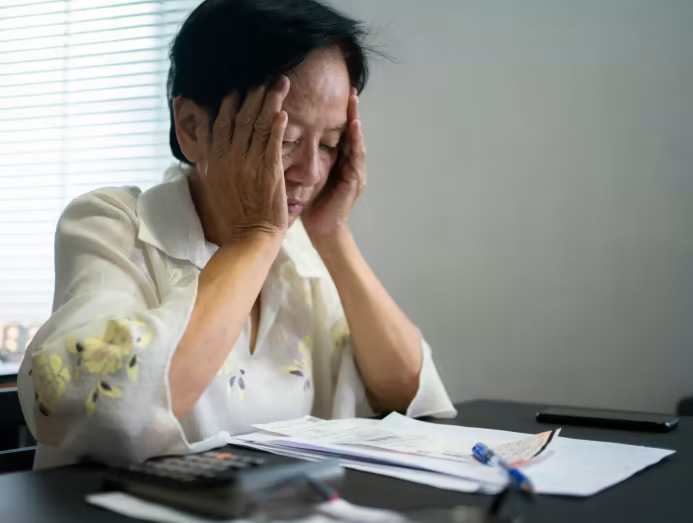Within the realm of domestic violence, financial abuse disproportionately affects women. CNA Women delves into this issue with insights from the Singapore Council of Women’s Organisations and a survivor of financial abuse, shedding light on crucial indicators to watch for and the available support channels for victims.
Anna*, a successful department manager with a thriving career and frequent work-related travels, crossed paths with her future husband while abroad. At that time, he was also working in the same location.
She found him to be an ideal partner – driven, financially prudent, compassionate, and gentle – and his lower income didn’t concern her. In 2004, after just a few months of acquaintance, they tied the knot, with Anna being 21 years old at the time.”
Little did she suspect that her marriage would turn into a nightmare and that she would become a victim of financial abuse, a form of family or domestic violence.
Shortly after tying the knot, her husband asked her to quit her job and move with him to Singapore. He promised to take care of her.
“It sounded like a normal and even kind-hearted gesture to me,” she said. “Family is important to me, so if I had to be a wife or mum at home, I was ready.”

“But even though he said he’d provide for me, I was given nothing,” Anna added. “When I had to buy things for the house or to cook, he would ask me to use whatever I had from the spare cash I had, keep the receipt from the shop, and then he’d pay me back – as if I was claiming from a company.”
Throughout her 15-year marriage, Anna faced what Lorraine Lim, the Deputy CEO of the Singapore Council of Women’s Organisations (SCWO), describes as financial abuse.
What financial abuse looks like in a marriage
Lim defined financial abuse as “one form of violence in a relationship where the perpetrator exerts power and control by deliberately limiting the victim’s access to financial resources”.

Lim added, “While theoretically gender-neutral, it tends to affect women more frequently than men, in reality. Women are more likely to be financially dependent on their spouses due to traditional gender roles of being at home and/or being the primary caregivers of children or the elderly.
“They are also likely to earn less than their spouse and may have less stable incomes. Migrant wives are also at risk as they rely on their husbands for social, legal and financial support.”
What’s tricky about financial abuse is that even though it causes distress to the victims, it’s hard to recognise as the abuser may appear kind and not be physically abusive, Lim said.
Some tell-tale signs of financial abuse to look out for include:
- Forbidding you to work without a proper reason
- Sabotaging your career by deliberately making you look bad in front of your employers, such as making you late for work or ruining your work attire, so that you lose your job or miss a promotion, which further restricts your access to money
- Taking control of your own or shared bank accounts and denying you access to them
- Withholding assets, such as house ownership, from you
- Giving you an allowance that prevents you from obtaining basic needs for yourself or your children
- Running a large amount of debt on credit cards under your name
Right after Anna got married, her husband insisted on knowing about all the transactions in her bank account, even when the activity did not concern him.
He told her that as her husband, he should oversee all their money. He also said that he wanted to take care of her, and didn’t want her to work or worry about finances.
But this wasn’t the case, in reality. Anna found it difficult to ask her husband for money – he would question her and make her feel guilty for wanting to buy anything.
“Once, my shirt was torn and he asked whether I really needed a new shirt and kept grumbling that it was a waste of money to buy a new one for me,” Anna said.
“I had no money except for the rare times he would give me cash to spend at the supermarket and I could keep the change,” Anna added. “Or when he’d give a little more than what I’d spent in a single receipt. Whatever few coins I could get, I would save secretly.”
When the couple had kids, it became even more difficult for Anna to ask her husband for money.
“I had to be the one taking care of the kids and buying them things,” she said. “But I wasn’t given any money for baby essentials like food and diapers or new clothes.”
She had to wait for her husband to buy what the kids needed or, when the situation was desperate, scrape together whatever she had from her secret stash to pay for them herself.
“Throughout those years of my marriage, I was so stressed and anxious yet I felt powerless,” Anna said. “I felt as though he was questioning me all the time for every single thing I needed to get for me, for our household, for our family — I always felt wrong to ask.”
Ways women can prevent financial abuse

When it comes to preventing any type of domestic violence, including financial abuse, Lim believes in the ACT principle, namely being Aware, Connecting and Taking Precautions.
First, be aware of the signs of financial abuse. This means knowing what it can look like, and the red flags associated with being taken advantage of financially, Lim said.
Second, the victim must connect with someone they trust – a friend or even a neighbour – to share their situation, such as having no access to money to buy essentials. Lim stressed that such a connection could be vital in seeking help and providing a sense of safety.
Third, the woman must take preventive measures to protect her assets. Lim recommends that every person, especially if they’re a stay-at-home spouse, have a personal bank account, in addition to the couple’s joint account. Having separate finances from the abuser can safeguard her financial independence.
However, Koh Yan Ping, the CEO of SCWO, said that in reality, people may not implement ACT for various reasons, such as a lack of knowledge or exposure.
“But we must still try,” Koh said. “It’s why we do a lot of community outreach. People need to know what ACT is about and what the signs of abuse are. Knowing is the first key step to prevention.”

Where victims of financial abuse can find support
“Thankfully, there are policies and bodies in place to assist and support victims of financial abuse,” Lim said.
In 2016, 12 years into a marriage in which she had no control over her money, Anna reached breaking point after a huge argument with her husband, which left her and her children homeless for a few days.
“I went to a family service centre, where they had signs asking for victims of domestic abuse to come forward if they needed help. Even though I didn’t want to think of it back then, I knew I was a victim,” Anna recalled. “The centre referred me to SCWO, who helped place me in Star Shelter.”
Star Shelter is a safe space run by SCWO for women and children who are victims of family violence. There, Anna received the support she needed to break away from her abusive marriage.
Through SCWO’s Maintenance Support Centre, which provides pro-bono legal advice to victims of domestic abuse, Anna sought maintenance from her husband. This form of financial support involves him providing a fixed sum of money to Anna and her children monthly.

SCWO also provides counselling services at highly subsidised rates, run by trained counsellors and peer counsellors who have gone through similar circumstances.
“Many women who come to SCWO following a financial abuse case end up being diagnosed with depression,” Lim said. “They are likely going through or are fresh from an agonising divorce, and are very worried, very anxious, and unsure how they could even move on.
“Our counselling services aim to help victims heal and gain better confidence. They are paired with courses by our community partners to help the women upskill and reskill to get jobs and support themselves.”
With SCWO’s help, Anna finalised her divorce in 2019, gained full custody of her two children, and upskilled enough to find a job.
“It’s very different from when I was a manager,” she said. “But this is a million times better for me and my children than what I went through in my marriage.
“I used to think I was stuck, I didn’t even know what happened to me was financial abuse, but I’m in a better place now,” Anna said. “I don’t want any woman to go through what I did, and if they are, I want them to know that they’re not alone.”
*Name has been changed to respect the woman’s privacy.


